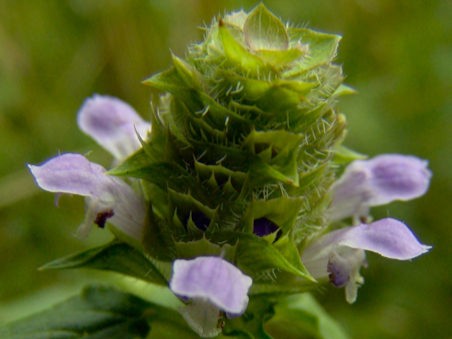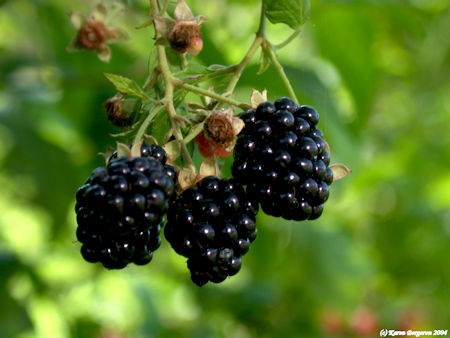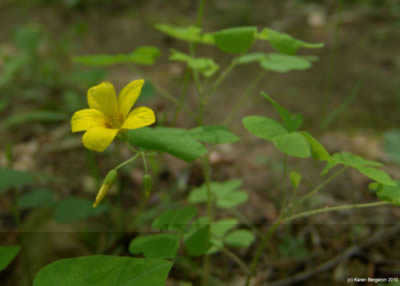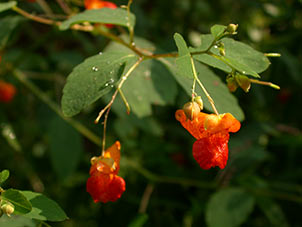Alternative Nature Online Herbal
Teaching about Wild Herbs Online since 1997

The Heal All Plant

Blackberries

Wood Sorrel

Jewelweed
Wild Herb Harvesting and Basic Preparations
Harvesting Guidelines for Wild Herbs
Consult a good field guide like Newcomb’s Wildflower Guide. Learn the exact ID of the plants, as well as their poisonous look-alikes so you can safely harvest the right plants. Never use a plant unless you are 100% sure of its identity.
Do not harvest plants from polluted ground or near roadsides as plants absorb pollutants from the soil that they grow in.
All the plants in this article are common enough to collect freely. Never harvest endangered or rare plants. Do not take plants from parks or private property without permission.
Herbal Preparations
You can use a single herb or combine herbs that have similar properties and usage for these preparations. Use them in moderation as “less is often more” when it comes to herbs.
Herbal Tincture
To make a tincture, fill a jar ? full with chopped, fresh herbs and cover rest with 100 proof vodka. If you use dried herbs, you will only load the jar half full of herbs as the plant material will swell when it absorbs the liquid. You want the herbs to stay covered with the alcohol at all times. Put the lid on tight, and shake vigorously. Store in a dark cabinet and shake the jar once or twice a day for two weeks. Don’t worry if you miss a day but do it often. After two weeks, it will be evident that the alcohol has absorbed the color, aroma, and taste of the herbs used. Strain off the liquid from the herbs, and that is your tincture. It is usually taken in dropperful doses. Tinctures made with alcohol are the longest lasting of all preparations. You can then use the leftover herbs in a bath soak, then add them to your compost pile.
Liniment
You can get another use for herbs leftover from tincturing by covering them again with Witch Hazel (the distilled kind you get at the drugstore) and letting it sit overnight. Strain off the Witch Hazel, add 1-2 ounces of tincture to of the Witch Hazel liquid and you have a skin toner or liniment. You can also add a few drops of essential oil to this as long as you shake it well before using.
Poultices
To make a poultice, put herbs in a pan and cover with water. Bring to a boil, turn heat down and simmer for ten minutes. Allow to cool to a comfortable temperature, then wrap the wet herbs in cotton gauze, muslin, or other absorbent material, saturating it with liquid and apply to wounds or sore muscles.
Infusions
Infusions are made like tea. They are mostly used for leaves and flowers. Steep a teaspoon of dried, or a tablespoon of fresh herbs in a cup of hot water for ten minutes. For best results, cover while steeping to prevent the herbal properties from evaporating.
Decoctions
Decoctions are made by bringing herbs covered with distilled water to a boil, then covering and simmering them for 20 minutes or more. This method is usually utilized for roots, barks, and seeds whose properties are not well absorbed in an infusion.
Herbal Oils
Infused oils are best made with dried herbs, as using fresh herbs will add moisture that makes oil go rancid fast. To make an infused oil, fill a jar half full of dried herbs then top with a good botanical oil. Olive or Fractionated Coconut oils work well for this. Put the lid on tight, and shake it well and store in a warm, dry place. Like tincture, it is best to shake this once a day or so. After a week or so, you can strain off the oil. Discard remaining herbs or use some in an herbal bath.
To make a salve or ointment, heat the oil to 175 degrees and add one part beeswax to 6-8 parts oil. When the wax is completely melted, stir the mixture thoroughly. Pour in jars or tins and let cool.
Herbal Baths
Herbal baths may be used for sore muscles, strains, and irritated skin, or just to relax and have a spa experience in your own home. There are many ways you can use herbs in the bath. You can simmer a handful or two for 10 minutes, strain and add the water to your bath, or add herbs to a muslin bag or old sock and put it in your bath water. You can then squeeze the herb bag on your skin in the bath to enjoy the aroma and soothing properties. Herbs leftover from making your tinctures, decoctions, and infusions can also be used right after they are strained.
Body Scrubs
Many herbs have seeds that can be ground and used for beneficial body and face scrubs, due to their anti-inflammatory and antioxidant properties. Make sure the seeds are totally dry, grind them in a coffee grinder, then add enough of a good botanical oil to just cover the ground seeds. Mix it up, and you have a moisturizing body scrub for exfoliation.
I hope this article has inspired you to learn about the common plants that show up this time of year, and how they can be used in your daily life.
Disclaimer
The herbal information on this web site is intended for educational purposes only. It is not the intention of the editor to advise on health care. Please see a medical professional about any health concerns you have. These statements have not been evaluated by the FDA. The information on this web site is not intended to prevent, diagnose, treat, or cure any disease.
Thank you and come back again!